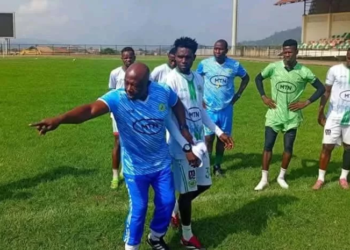World Cup goals could provide a much-needed economic boost for Cameroon, says Oliver Clarke.
Nothing unites the 16 million people of Cameroon – who, between them, speak 24 language groups and belong to more than 230 tribal groups – better than the national football team.
The Indomitable Lions, as they are known, are the most successful national side on the continent. They are the holders, and four times winners, of the African Nations’ Cup, the current Olympic champions and the only African team to have reached the World Cup quarter-finals, which they did in 1990, reaching the final stages for the fourth time.
« All Cameroonians identify with the victories of the Lions, » says Bidoung Mkpatt, the Minister of Youth and Sports. « This helps them bury their divergent views on other issues and is an important factor in maintaining and consolidating peace in the nation. »
But what accounts for this extraordinary success? Not fine facilities or grand salaries, that’s for sure. All the local players are amateurs, or play for extremely modest remuneration. Mohamed Iya, the president of the Cameroonian Federation of Football, says wages range from £50 to £100 a month.
The central African country also boasts little in the way of a sporting infrastructure. It has only two « large » stadiums, in Yaounde, the capital and Douala, the port and commercial centre. These were built 40 years ago. Both are not only outdated, but fail to conform to any normal safety standards. There are no large modern stadiums and no decent practice fields.
Living conditions in Cameroon are not that great either. Douala, the economic heart of the country, generating 70 per cent of its economic output, suffers from severe shortages of electricity, water and basic sanitation. Its port employs more than 1,000 workers, handles 5.5 million tonnes of goods a year and, thanks to its strategic location, has ambitions to become the busiest in Africa, but is desperate for investment.
Douala’s football stadium is just as desperate. Built in 1972 to host the African Nations’ Cup, its condition has declined steadily. It was built hastily and not completed, says Edouard Etounde Ekotto, president of Douala’s autonomous sea port. « There was a big scandal that swept away everybody involved in its construction and that was it. »
Despite that fiasco, Ekotto believes football could contribute much more to the socioeconomic growth of the city and the nation.
« If we could build small stadiums, of a capacity of between 25,000 and 30,000, to host sporting activities, we could create a conducive environment for economic growth. »
Many opportunities are available to foreign investors, he says, and he hopes that the high profile of the national football team in the World Cup finals may induce greater interest in Cameroon’s potential. He is incredulous that, as yet, not one UK company has shown any interest in investing.
Jean Williams Sollo, general manager of the National Forestry Development Agency, also believes that Cameroon needs to exploit its footballing talents.
« We must transform football into an economic good, a commodity. This will create a forum for other enterprises. What we need now are the appropriate financial conditions and a conducive legal environment. »
With 78 per cent of its area covered in forests, Cameroon depends heavily on trees as an export commodity. It is the forest agency’s task to maintain the delicate balance between sustainability and timber production. But Sollo has also been pressing the timber industry bosses to build sporting facilities for their workers.
« I think private logging companies should build gymnasiums which could incorporate basketball, handball and tennis courts as well as football pitches, » he says.
So far these efforts have been unsuccessful, but Sollo reckons that if the Lions can succeed in this year’s World Cup finals, it may provide just the kind of impetus needed to get the co-operation he seeks.
The national brewery, Brasseries du Cameroun, has already recognised the business and social benefits of investing in sporting infrastructure. It started a football school and two-thirds of its graduates now play in the national team. Others are also keen to invest because of the benefits that can be reaped from the game.
The hope among Cameroonians is that World Cup success will bring about the much-needed improvement in sporting facilities.
Every game played in the group phase will bring in about £560,000, and if the Indomitable Lions qualify for the second round they will receive about £600,000 a game and £900,000 for the final.
There is already a project under way, in co-operation with China, to build a multisport complex in Yaounde. Cameroon has signed a convention for the financing of the £3.9 million project, but no precise date has been set for construction.
(c) Times Newspapers Ltd, 2002.
Source: THE TIMES 28/05/2002











